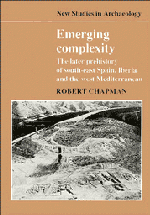Book contents
- Frontmatter
- Contents
- List of figures
- List of tables
- Preface
- 1 Two tribes: questions of theory, scale and explanation
- 2 Hello, goodbye: Iberian prehistory and traditional archaeology
- 3 Another one bites the dust: the implications of the absolute chronology
- 4 Getting better: south-east Spain, the cultural framework 5000–500 bc
- 5 Dancin' in the dark? Adaptation and intensification in south–east Spain
- 6 Centrefield: recent models of intensification and cultural change in south-east Spain
- 7 Into the groove: system scale and technological innovation in south-east Spain
- 8 Out of reach? Complexity, interaction and integration in south-east Spain
- 9 Eliminator: models and the archaeological record in south-east Spain
- 10 Strong persuader: intensification and interaction in Iberia and the west Mediterranean
- 11 With or without you: variability, evaluation and complexity
- Bibliography
- Index
9 - Eliminator: models and the archaeological record in south-east Spain
Published online by Cambridge University Press: 05 March 2012
- Frontmatter
- Contents
- List of figures
- List of tables
- Preface
- 1 Two tribes: questions of theory, scale and explanation
- 2 Hello, goodbye: Iberian prehistory and traditional archaeology
- 3 Another one bites the dust: the implications of the absolute chronology
- 4 Getting better: south-east Spain, the cultural framework 5000–500 bc
- 5 Dancin' in the dark? Adaptation and intensification in south–east Spain
- 6 Centrefield: recent models of intensification and cultural change in south-east Spain
- 7 Into the groove: system scale and technological innovation in south-east Spain
- 8 Out of reach? Complexity, interaction and integration in south-east Spain
- 9 Eliminator: models and the archaeological record in south-east Spain
- 10 Strong persuader: intensification and interaction in Iberia and the west Mediterranean
- 11 With or without you: variability, evaluation and complexity
- Bibliography
- Index
Summary
In chapter 6 I summarised five models of the intensification of production and the emergence of increased cultural complexity in south-east Spain, principally in the third and second millennia be. Two of these models (Chapman, Mathers) had their basis in ecological and systems theory, while the other three (Gilman, Lull, Ramos) used Marxian theory. The question then arises as to how we can evaluate these models, one against another. An alternative question would be to ask how we can take advantage of these differing models to generate research capable of increasing our knowledge of the archaeological record, so that the ideas contained in these models can be subjected to some form of empirical evaluation? The existence of competing models is thus seen as a strength, rather than a weakness, of current work on southeast Spanish prehistory. Such models may be criticised on the basis of weaknesses in their theoretical assumptions and structure, and on the basis of the comprehensiveness, predictiveness, efficiency and accuracy (Clarke 1972, p. 4) with which they can be applied to the archaeological record. In the discussion which follows, I will make some initial points about theories and assumptions, before summarising the empirical evidence for the variables which have been analysed in chapters 7–8. At the same time the implications of this evidence for the different models will be raised and directions for future research outlined.
- Type
- Chapter
- Information
- Emerging ComplexityThe Later Prehistory of South-East Spain, Iberia and the West Mediterranean, pp. 211 - 219Publisher: Cambridge University PressPrint publication year: 1990

